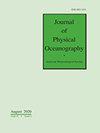Parameterizing eddy buoyancy fluxes across prograde shelf/slope fronts using a slope-aware GEOMETRIC closure
IF 3
2区 地球科学
Q1 OCEANOGRAPHY
引用次数: 0
Abstract
Accurate parameterizations of eddy fluxes across prograde, buoyant shelf and slope currents are crucial to faithful predictions of the heat transfer and water mass transformations in high-latitude ocean environments in ocean climate models. In this work we evaluate several parameterization schemes of eddy buoyancy fluxes in predicting the mean state of prograde current systems using a set of coarse-resolution non-eddying simulations, the solutions of which are compared against those of fine-resolution eddy-resolving simulations with nearly identical model configurations. It is found that coarse-resolution simulations employing the energetically-constrained GEOMETRIC parameterization can accurately reconstruct the prograde mean flow state, provided that the suppression of eddy buoyancy diffusivity over the continental slope is accounted for. The prognostic subgrid-scale eddy energy budget in the GEOMETRIC parameterization scheme effectively captures the varying trend of the domain-wide eddy energy level in response to environmental changes, even though the energy budget is not specifically designed for a sloping-bottomed ocean. Local errors of the predicted eddy energy are present but do not compromise the predictive skill of the GEOMETRIC parameterization for prograde current systems. This work lays a foundation for improving the representation of prograde current systems in coarse-resolution ocean climate models.利用坡度感知的 GEOMETRIC 闭合模型为顺行陆架/斜坡前沿的涡浮力通量参数化
要在海洋气候模式中忠实地预测高纬度海洋环境中的热传递和水质量转换,就必须对顺流、浮力陆架流和斜坡流的涡通量进行精确的参数化。在这项工作中,我们利用一组粗分辨率非漩涡模拟,对预测顺流系统平均状态的几种漩涡浮力通量参数化方案进行了评估。结果发现,采用能量约束的 GEOMETRIC 参数化的粗分辨率模拟可以准确地重建顺流平均流态,前提是要考虑到大陆坡上涡浮力扩散的抑制作用。尽管 GEOMETRIC 参数化方案中的预报性子网格尺度漩涡能量预算不是专门针对坡底海洋设计的,但它能有效地捕捉全域漩涡能量水平随环境变化而变化的趋势。预测的涡能存在局部误差,但并不影响 GEOMETRIC 参数化对顺流系统的预测能力。这项工作为改进粗分辨率海洋气候模式对顺流系统的表述奠定了基础。
本文章由计算机程序翻译,如有差异,请以英文原文为准。
求助全文
约1分钟内获得全文
求助全文
来源期刊
CiteScore
2.40
自引率
20.00%
发文量
200
审稿时长
4.5 months
期刊介绍:
The Journal of Physical Oceanography (JPO) (ISSN: 0022-3670; eISSN: 1520-0485) publishes research related to the physics of the ocean and to processes operating at its boundaries. Observational, theoretical, and modeling studies are all welcome, especially those that focus on elucidating specific physical processes. Papers that investigate interactions with other components of the Earth system (e.g., ocean–atmosphere, physical–biological, and physical–chemical interactions) as well as studies of other fluid systems (e.g., lakes and laboratory tanks) are also invited, as long as their focus is on understanding the ocean or its role in the Earth system.

 求助内容:
求助内容: 应助结果提醒方式:
应助结果提醒方式:


